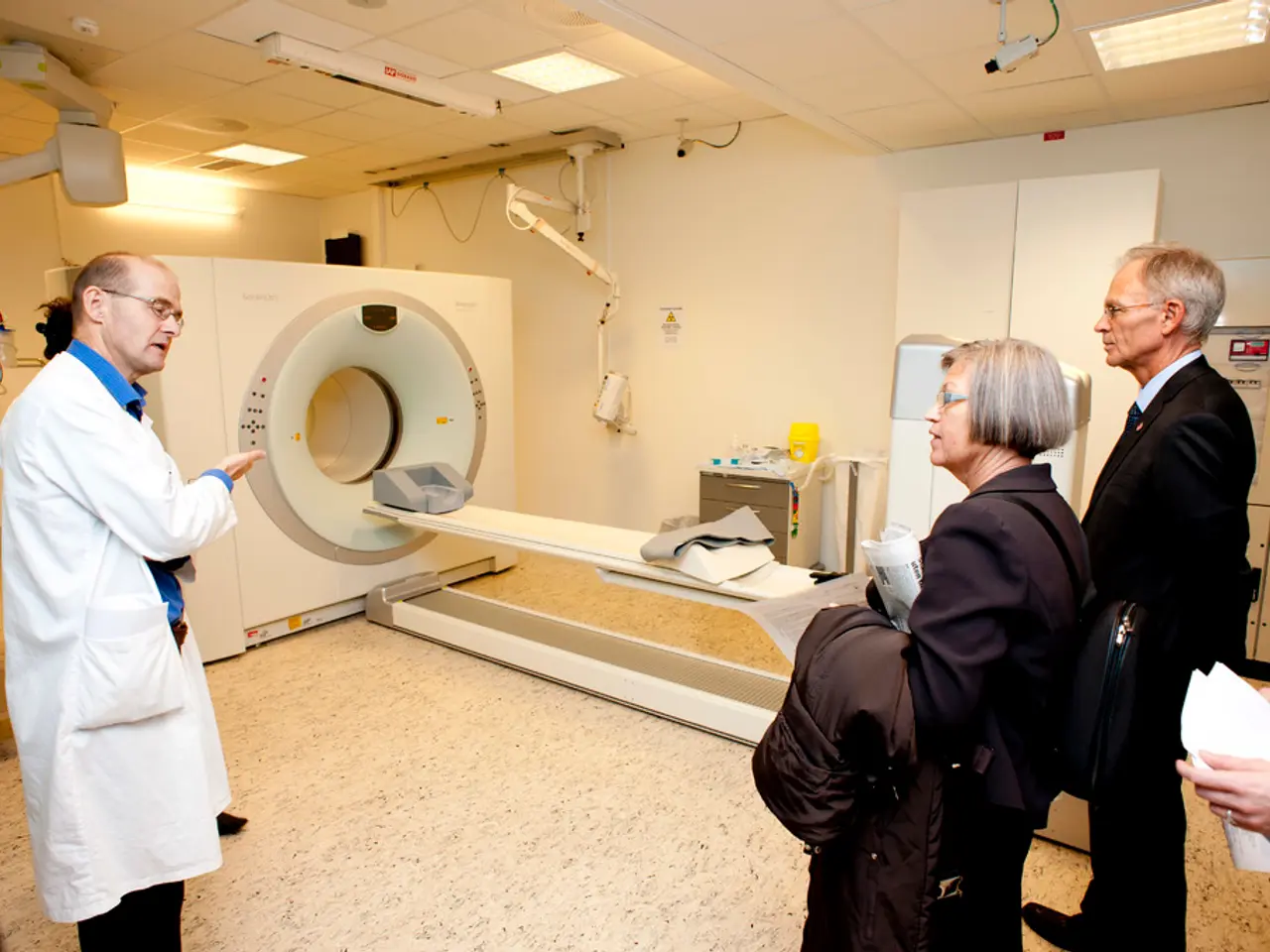CT Scans for Seizures: Procedures, Outcomes, and Details
CT scans, a type of X-ray, play a crucial role in diagnosing seizures. These scans are quick, usually lasting around 10 minutes, and are often used in emergency or acute settings due to their rapid availability and effectiveness for detecting serious causes such as bleeding or large structural lesions.
The main indications for performing a CT scan to diagnose seizures include a first-time seizure, the presence of focal neurological deficits, persistent altered mental status, history or suspicion of recent head trauma, and to detect structural brain abnormalities that could be seizure causes. CT scans might show atypical blood vessel or tissue growth in the brain that could be causing seizures.
The process of a CT scan is straightforward. People usually lie still on a table that slides into a large donut-shaped device. In some cases, healthcare professionals may administer an oral dye or inject a contrast dye to enhance the images. While this can help identify brain changes that could be causing seizures, it may lead to side effects such as diarrhea or pain, swelling, redness, or skin color changes at the injection site.
It's important to note that anyone with a history of kidney problems should notify their doctor if they receive a CT scan with a contrast dye, as the dye can cause further kidney problems. Healthcare professionals may also ask about allergies to contrast dyes or iodine before a CT scan with contrast.
After the scan, healthcare professionals may monitor the person for side effects. In some cases, they may order a follow-up CT scan to evaluate potential issues. The radiologist examines the CT scans and highlights any abnormalities. The healthcare professional then interprets these findings to decide whether further action is necessary or a diagnosis is possible.
While CT scans are safe procedures for most people, they involve a small amount of radiation. For chronic or unclear cases, MRI may be preferred for more detailed brain imaging. However, in acute situations, the speed and effectiveness of CT scans make them an invaluable diagnostic tool.
Pregnant individuals or those with metal in their bodies should inform healthcare professionals before a CT scan, as radiation exposure can affect the pregnancy, and metal can interfere with the scan.
In summary, CT scans are a valuable tool in diagnosing seizures, particularly in acute situations. They are quick, effective, and can help identify serious causes such as bleeding or large structural lesions. However, it's important to note that they involve a small amount of radiation and may not provide the same level of detail as MRI scans. Always consult with a healthcare professional to determine the best course of action for your specific situation.
- Science has advanced our understanding of epilepsy and seizures, leading to more effective treatments and diagnoses.
- Workplace wellness programs often include resources for managing chronic diseases like cancer, respiratory conditions, and digestive health.
- Eye health is a crucial part of overall health-and-wellness, as it affects our abilities to work and perform everyday activities.
- Hearing impairments can impact mental-health, leading to feelings of isolation and depression.
- Mens-health is a vital area of focus for medical-conditions that primarily affect males, such as prostate cancer.
- Skin-care is an essential aspect of self-care, helping to prevent skin-conditions like acne, eczema, and psoriasis.
- Therapies-and-treatments for neurological-disorders, like neurological-disorders such as epilepsy, can significantly improve patients' quality of life.
- Proper nutrition plays a vital role in managing weight-management and maintaining cardiovascular-health.
- Aging presents unique health challenges, such as mobility issues, cognitive decline, and osteoarthritis.
- Womens-health encompasses a wide range of concerns, from menstrual problems to reproductive health issues to bone health.
- Parenting requires knowledge of child development, including understanding normal growth patterns and recognizing potential signs of medical-conditions.
- Fitness-and-exercise are essential components of a healthy lifestyle, helping to reduce the risk of chronic diseases and improve overall well-being.
- Autoimmune-disorders, such as rheumatoid arthritis and lupus, can be challenging to diagnose and manage.
- Climate change has significant implications for public health, with increased air pollution and exposure to extreme weather events adversely affecting health.
- Mental-health is an important aspect of personal-finance, as it can impact one's ability to work and manage their wealth-management effectively.
- CBD has gained popularity as a potential treatment for a variety of medical-conditions, including epilepsy, chronic pain, and anxiety.
- The finance industry offers numerous resources for managing personal-finance, including investment advice, wealth-management, and retirement planning.
- Skin-conditions like acne, rosacea, and psoriasis can be managed with over-the-counter creams, prescription medications, and lifestyle changes.
- Space-and-astronomy fascinates many, offering insights into the environment and potential signs of life beyond Earth.
- Cybersecurity is increasingly important in the digital age, protecting individuals and businesses from online threats and data breaches.
- Lifestyle choices can significantly impact mental-health, with factors such as diet, exercise, and sleep playing a crucial role.
- Fashion-and-beauty trends often evolve in tandem with trends in food-and-drink, with health and sustainability becoming increasingly important considerations.
- Investing in assets like stocks, bonds, and real estate can help individuals grow their wealth and secure their financial future.
- Home-and-garden projects offer a way to embrace personal-growth and creativity, while also increasing the value of one's home.
- Businesses are recognizing the importance of supporting their employees' health-and-wellness, with many offering wellness programs and flexible work arrangements.
- Personal-finance management is crucial for long-term financial stability, with tools like budgeting and investing playing key roles.
- Artificial-intelligence and data-and-cloud-computing are playing increasing roles in healthcare, automating routine tasks and improving patient outcomes.
- Relationships with partners, friends, and family are vital for maintaining mental-health and overall well-being, while offering support during challenging times.





